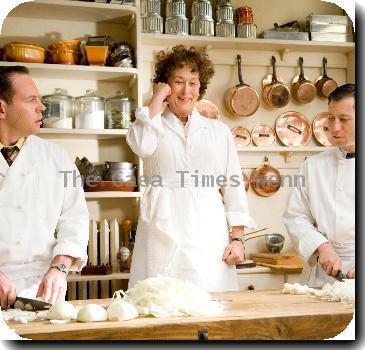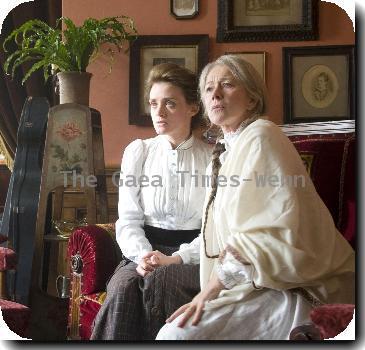2 hot movies, 2 big directors and 2 funny hosts could mean a robust audience Oscar night
By Frazier Moore, APFriday, March 5, 2010
Viewers are poised to flock to Oscarcast this year
NEW YORK — The Academy Awards have a tiresome habit of calling the annual Oscar telecast “Hollywood’s biggest night.”
This year the Oscarcast could prove to be a pretty big night for television, too.
The economy may be wheezing, but advertising time on ABC’s Academy Awards shindig (Sunday at 8:30 p.m. EST) is sold out, with the price tag reportedly $1.5 million per 30-second spot, up from less than $1 million last year.
And even in an era defined by eroding TV viewership, several promising signs — including the David-and-Goliath battle between “Hurt Locker” and “Avatar” — suggest Oscar could regain a measure of its past ratings glory.
Last year, the Oscarcast attracted 36.3 million viewers, with dark horse hit “Slumdog Millionaire” crowned best picture. In 2008, the audience, by Oscar standards, was even paltrier — just 32 million, as the not-for-everyone drama “No Country for Old Men” claimed the big prize.
But roll back the clock to 1998, when titanic interest surrounding “Titanic” helped bring an all-time-record of more than 55 million viewers to the show.
No big surprise — Oscar audiences are larger when a leading contender also happens to be a worldwide box-office phenomenon, and “Titanic” (with its dreamboat leading man, Leonardo DiCaprio) was a doozie.
“Titanic” brought the broadcast added suspense too: Would Oscar give its blessing to a hugely overbudget adventure-history-romance with more bombast than artistry that rose from near-disaster to be moviedom’s biggest and arguably most unlikely smash?
Everybody knows the answer to that — director James Cameron emerged that night as Oscar’s King of the World. And now, this year, most everybody knows that Cameron is back and has potentially topped himself with the 3-D sci-fi epic “Avatar.”
Even better, his ex-wife — the acclaimed director Kathryn Bigelow — is going toe-to-toe with Cameron in both the Best Director and Best Picture categories for her gritty, nowhere-near-big-budget military masterpiece, “The Hurt Locker.”
This sort of faceoff has sporting interest at almost every level: art vs. spectacle, realism vs. fantasy, woman vs. man in an industry where no woman has ever won the best director prize, plus dueling ex-spouses. Who could fail to be caught up in that multifaceted bout?
Most of the other major awards seem, well, a little predictable, leaving the suspense to the final minutes of the hours-long Oscar extravaganza. But who can quibble, with such nominees as Sandra Bullock, Meryl Streep, George Clooney and other faves guaranteeing the viewer prime star-gazing along the way, win or lose?
There’s even more to put a smile on Oscar’s deadpan face.
The Academy Awards hope to capitalize on a heartening upswing in recent months for big-event television.
The Grammys earlier this year drew 26 million viewers on CBS, up from 19 million in 2009. Ratings for the Golden Globes on NBC were up 14 percent, while the People’s Choice Awards on CBS got a bump of 15 percent.
The Super Bowl followed as the most-watched U.S. TV event of all time, drawing 106 million people to CBS. Most recently, the Olympics on NBC have consistently triumphed in the ratings; the opening ceremony drew 32.6 million viewers.
It’s possible that TV has turned the tide, at least with the right show, after years of dwindling ratings. Maybe in an uncertain world and a nervous economy, viewers are eager to embrace opportunities to commune electronically. (They certainly flock to Fox’s “American Idol,” which on certain nights beat the gargantuan Olympics, aired head-to-head.)
And there’s a new ingredient in the mix. Social media networks, which facilitate swift, real-time response on sites such as Twitter and Facebook, have helped rally large audiences who share in an unfolding TV show through a corresponding, interactive channel.
Go figure: the Internet, which some traditionalists warn will kill old-fashioned TV, can, under the right circumstances, supercharge it.
And speaking of old-fashioned, the Oscars are boasting some venerable box-office appeal with its co-hosts: Alec Baldwin and Steve Martin (who hosted solo in 2000 and 2002).
While neither of them is young or pretty, at their best they are two of the funniest men alive, with Baldwin blossoming in recent seasons on the NBC comedy “30 Rock.” Furthermore, they are bonded by friendly rivalry as the two champs of “Saturday Night Live” hostmanship: Martin currently has logged 15 host appearances, while Baldwin is runner-up with 14.
The curiosity factor of seeing these veteran funnymen join forces for one of TV’s most daunting tasks — keeping an inherently bloated awards show both moving and amusing — could prove to be an audience draw all its own.
That is, if you can see it. An added dose of intrigue for this year’s Oscarcast has been inflicted on some 3.1 million New York City area Cablevision subscribers. Cablevision is currently squabbling with ABC in a dispute over how much the network is paid by the cable operator. If that fight isn’t resolved pronto, WABC owner Walt Disney Co. has warned it will pull the station off the cable system after midnight Saturday.
Even if that happens, life will go on. A loss of as much as 3.1 million viewers is unlikely to make a crucial ratings difference in a flush Oscar year like this one promises to be.
And if ABC does go dark on Cablevision, chances are the message will reach deprived New Yorkers. After all, there’s always radio, texting and Twitter.
ABC is owned by The Walt Disney Co.
On the Net:
www.abc.com
Tags: 82nd Academy Awards, Alec Baldwin, Arts And Entertainment, Award Shows, Celebrity, Events, George Clooney, Leonardo Dicaprio, Movies, New York, North America, Sandra Bullock, Steve Martin, Twitter, United States


watchtoystory3live.com